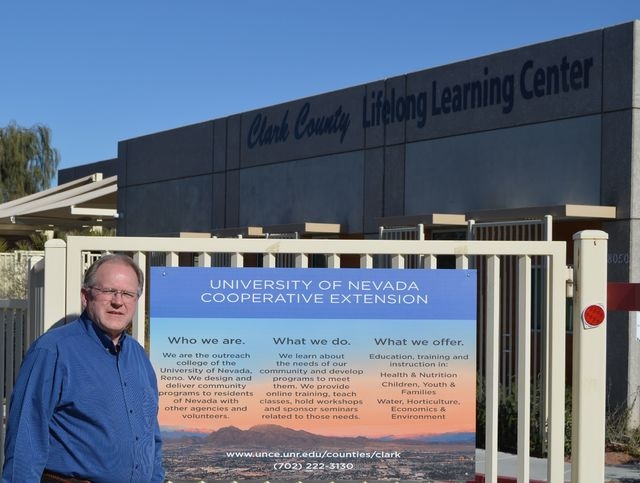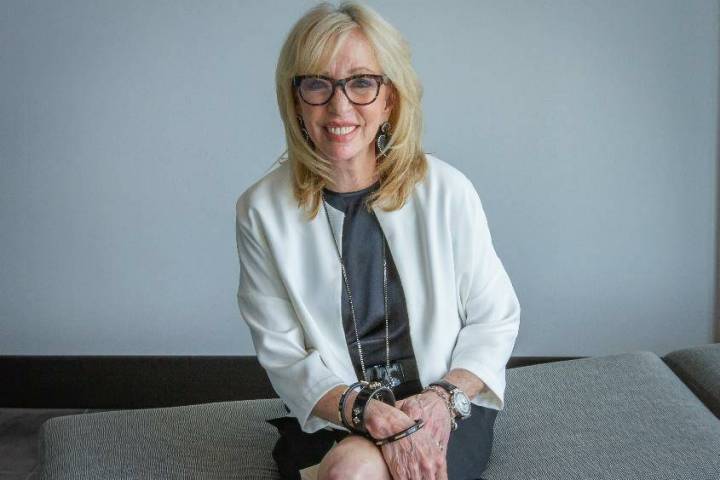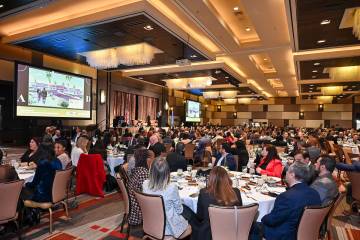
Eric Kilian has been Southern Area director of the University of Nevada Cooperative Extension for less than a month and is eager to show off the program.
He’s a tenured faculty member at the University of Nevada-Reno and his responsibilities range from training child care providers to guiding the 4H.
Kilian was born and raised in California. He received his bachelor’s in family and human development from Utah State University and a master’s in family life education and consultation from Kansas State University.
He began his work with Cooperative Extension through his graduate program when he worked on a statewide child care training program. After receiving his degree, he moved into a Cooperative Extension position in Idaho, where he also worked with a 4H program.
He eventually came to the University of Nevada, where he worked in youth and staff development. When the director’s job opened, he stepped in as interim director before getting the permanent job Jan. 1.
Q. What do the words “Cooperative Extension” mean when they’re attached to University of Nevada or some other organization?
A. The cooperative part is easy to explain: the funding that we get at cooperative extension is different than normal state agencies. The (word) cooperative … (means) that we have a little federal money that’s given to the state, the state then gives us money, and then the county gives us money; so, that’s where the cooperative word comes in. So our funding comes from three different sources; it’s not all state-funded or county-funded or vice versa. It really is a partnership between the county, the state, and the federal.
The county basically pays for a lot of the operating expense so here in Clark County, we are fortunate; everybody who owns a home, on their property tax bill there’s a little section there for cooperative extension. The last couple of years that’s been about $5.2 million that we receive. Most of that money goes for the operating expenses for doing the work that we do and the bulk of it goes to covering the staff.
Q, What programs do you offer?
A. We have a children, youth, and family services team. They address the human development lifespan. We have one faculty member that teaches parents through a couple of variety programs on literacy issues.
We have another faculty member who’s working with child care providers. The state has requirements of hours per year where they have to go to professional development training; we’re providing training to meet those hours. There (is an) additional program called the child development associate credential, (which has people) work up a progression of 120 hours and get a certification.
We have some youth development programs meeting the needs in schools today. A lot of the kids aren’t getting workforce skills or what we call soft skills like working in teams, critical thinking, problem solving, directly. We have some youth development programs that address that.
We have a 4H program that still has some of the (agriculture) components for livestock and horses, as well as, skateboard clubs, hiking clubs, cooking clubs and so on.
Then we also have the WHEEE team, which is water, horticulture, environment, education, and economics. One of the huge programs you might be familiar with is the Master Gardner program. Gardeners come in, get 80 hours of training, and then have to give back 40 hours in volunteer time. We have people that sit up in the front of our reception area; you as a local citizen can either come in or call on the phone and say, “Hey, I have a tree that’s doing this,” and they’ll help figure out what’s wrong.
Q. How do you feel about your budget?
A. The last five, six years when the economy started tanking, budgets got tighter. We’ve been drastically reduced. For example, Cooperative Extension used to have a state line item in the state’s budget that was about $8 million that was reduced to about $3 million. With that reduction, a lot of things have trickled down. Here in our office, the faculty was reduced to 85 percent of a full-time position. They felt it was much more humane to try to keep everybody working at a lesser level than to just get rid of a bunch of people and positions. So the faculty then has to go out and get and other sources of funding to keep their salaries at 100 percent. The budget used to be close to $8 million a years; now it’s $5.2 million for the last two three years. So we’ve adapted.
Q. What should people know about your services?
A. Cooperative Extension, it seems like, tends to be one of the best kept secrets. Our building is at (the) 215 (Beltway) and Windmill (Lane). We’d love to have people that don’t know Cooperative Extension and don’t know what we do, just stop by, come in, we’d be happy to give tours. Most of our programs don’t have a cost to them. One thing we like to say, especially for young people, is that you’re just now taking your first university class. We’re open Monday through Friday 8 a.m. to 5 p.m.






